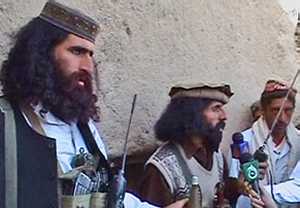 [Khaama (Afghanistan)] The United States has shared a list of at least twenty terrorist groups with Islamabad which Washington insists use the Pak soil for the terrorist activities in Afghanistan and elsewhere, it has been reported.
[Khaama (Afghanistan)] The United States has shared a list of at least twenty terrorist groups with Islamabad which Washington insists use the Pak soil for the terrorist activities in Afghanistan and elsewhere, it has been reported.Diplomatic sources have confirmed to the local news outlet Dawn News that the White House retains a list of 20 terrorist groups that the Trump administration claims are operating in Pakistain.
The sources further added that the list has reportedly been shared with Islamabad by Afghanistan and the United States.
In the meantime, reports indicate that the US Secretary of State Rex Tillerson has said the US and Pakistain had been engaged in "a very healthy exchange of information on terrorists" since his visit to Islamabad last week.
Tillerson has further added that further information will also be shared with Pakistain in the future to include information on "specific location on any given day of where certain individuals or certain cells may be located."
According to reports, the Haqqani terrorist network is on the top of the list shared with Islamabad as the US officials are saying that the network has safe havens in Fata and uses them to launch attacks into Afghanistan.
But the Pak officials reject the claims by Washigton and insist that no such safe havens exist in the country.
Added from Dawn:
Top on the list is the Haqqani network which, the United States claims, has safe havens in Fata and uses them to launch attacks into Afghanistan. Pakistan strongly rejects the charge, saying that there are no such safe havens inside the country.
Harakatul Mujahideen is a Pakistan-based militant group operating primarily in Kashmir. The US says that group had links to Osama bin Laden and Al Qaeda as well.
Jaish-e-Mohammed operates mainly in Kashmir and the liberation of the Indian occupied Kashmir is its declared objective.
Jundullah is associated with the Tehreek-i-Taliban Pakistan (TTP) and was commanded by militant Hakimullah Mehsud, the Emir of TTP until his death in November 2013. It had vowed allegiance to the militant Islamic State group.
The United States identified Lashkar-e-Taiba as one of the largest and most active terrorist organisations in South Asia. Founded in 1987 by Hafiz Saeed, Abdullah Azzam and Zafar Iqbal in Afghanistan, the group had its headquarters in Muridke. It too is focused on Kashmir.
Lashkar-e-Taiba was involved in the 2001 Indian parliament attack and the 2008 Mumbai attacks.
Lashkar-i-Jhanghvi, an offshoot of anti-Shia sectarian group Sipah-i-Sahaba Pakistan, was founded by former SSP activists Riaz Basra, Malik Ishaq, Akram Lahori and Ghulam Rasool Shah.
The US blames this group for committing hundreds of target killings and dozens of mass attacks inside Pakistan.
Tehreek-i-Taliban Pakistan, an umbrella organisation of various militant groups, was based in Fata, but has now relocated to Afghanistan. The US says that the group wants to enforce its own interpretation of Sharia and plans to unite against Nato-led forces in Afghanistan. It has conducted hundreds of terrorist attacks inside Pakistan.
Other groups on the list are: Harakatul Jihadi-i-Islami, Jamaatul Ahrar, Jamaatud Dawa al-Quran and Tariq Gidar Group, which is one of 13 TTP affiliates. The Tariq Gidar Group has been behind some of the deadliest attacks inside Pakistan, including the Dec 16, 2014, massacre at the Army Public School in Peshawar that left 132 schoolchildren and nine staffers dead.
Islamic Revolutionary Guard Corps, Commander Nazir Group, Indian Mujahideen, Islamic Jihad Union, Islamic Movement of Uzbekistan ISIS-Khorasan, Al Qaeda in the Indian Sub-Continent and the Turkistan Islamic Party Movement are also on the list.

 Two Abu Sayyaf terrorists and an Indonesian militant were convicted by a court in Manila for their role in a bombing at a shopping center in General Santos in 2002 that killed at least 14 people.
Two Abu Sayyaf terrorists and an Indonesian militant were convicted by a court in Manila for their role in a bombing at a shopping center in General Santos in 2002 that killed at least 14 people. Manshera: Longhaired gunmen burst into the white stone building and killed four charity workers helping earthquake victims, then wrecked the office with grenades and set it on fire. Police came, but did not intervene.
Manshera: Longhaired gunmen burst into the white stone building and killed four charity workers helping earthquake victims, then wrecked the office with grenades and set it on fire. Police came, but did not intervene.  A member of a terrorist group linked to Al Qaeda has been deported to Pakistan after being detained for over a year, US investigators said on Friday. Pakistani native
A member of a terrorist group linked to Al Qaeda has been deported to Pakistan after being detained for over a year, US investigators said on Friday. Pakistani native